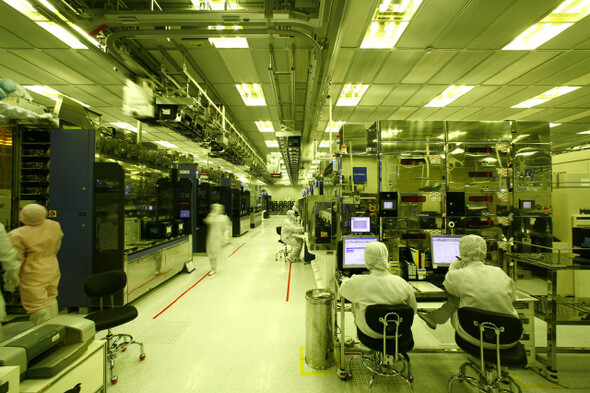hankyoreh
Links to other country sites 다른 나라 사이트 링크
SK Hynix agrees to compensate workers with occupational diseases

SK Hynix announced plans on Nov. 25 to offer sweeping compensation to current and former semiconductor factory workers, and even those of its subcontractors, connected with suspected occupational diseases.
With this decision, the company is accepting the recommendation of an industrial and public health review committee that conducted a yearlong inspection of Hynix semiconductor working environments.
The SK Hynix investigation committee for workplace health and safety, headed by Ajou University preventive medicine professor Jang Jae-yeon, held a press conference in Seoul on Nov. 25 to propose the support and compensation measures to the company - while conceding that the causal relationship between the semiconductor working environment and suspected occupational diseases was “difficult to prove.”
In response, SK Hynix said it would accept the independent committee’s recommendations “immediately.”
The committee was formed in the wake of a 2014 report in the Hankyoreh on suspected occupational ailments among Hynix semiconductor factory workers. That October, a team of seven outside independent experts was formed to conduct on-site inspections.
The committee subsequently said that 18 carcinogenic or toxic substances, such as ethylbenzene, were present among the 860 chemicals used at the workplace, but that workers had not been exposed to them.
But later analysis of health assessment findings and National Health Insurance Service data showed a metabolic syndrome incidence rate among production workers 2.4 to 3.2 higher than among office workers. Male and female workers showed respective thyroid cancer rates 2.6 and 1.3 times the average for all workers, while women showed higher-than-average rates of miscarriage (1.3 times) and bladder cancer (1.1 times).
According to the committee, a direct connection between the high probabilities of contracting certain diseases and work at Hynix is difficult to establish. “Fundamentally, it is difficult to establish a causal relationship in cases of cancer, where the mechanism behind its emergence is so complex, or rare diseases that occur only at very low rates,” explained Jang.
“We would need to track and manage incidence rates for a period of ten to twenty years, and the problem there is that people couldn’t get compensation if we judged it strictly by causation,” Jang continued.
“That’s why we are proposing a comprehensive support and compensation system that provides the basic level needed for patients whose health has been impaired to treat their conditions and maintain everyday life,” he explained.
The committee’s recommended support would extend to all cases of cancer, miscarriage, and rare diseases suspected of even slight connection with the semiconductor industry for current and former employees at subcontracting businesses and their children.
“The committee’s determination was that if you contracted cancer while working somewhere, society should not just ignore that,” Jang said.
SK Hynix responded by saying it would “implement support and compensation for all patients with suspected [occupational disease] conditions in according with our company’s social role.”
The company added that it would work quickly to establish an independent support and compensation committee made up of labor and management representatives and outside experts to develop support and compensation procedures.
“I’m gratified to see the company come out even at this point to offer compensation and support after being so uncooperative during the industrial accident claim process,” said Jang Yeong-eun, the 47-year-old widow of Jeong Cheol-mo, who died of lymphoma while working at Hynix. Thirteen of the 39 people who contracted suspected occupational diseases after working at Hynix between 1995 and 2010 have since passed away.
By Lee Jeong-hun, staff reporter
Please direct questions or comments to [english@hani.co.kr]

Editorial・opinion
![[Column] Park Geun-hye déjà vu in Yoon Suk-yeol [Column] Park Geun-hye déjà vu in Yoon Suk-yeol](https://flexible.img.hani.co.kr/flexible/normal/500/300/imgdb/original/2024/0424/651713945113788.jpg) [Column] Park Geun-hye déjà vu in Yoon Suk-yeol
[Column] Park Geun-hye déjà vu in Yoon Suk-yeol![[Editorial] New weight of N. Korea’s nuclear threats makes dialogue all the more urgent [Editorial] New weight of N. Korea’s nuclear threats makes dialogue all the more urgent](https://flexible.img.hani.co.kr/flexible/normal/500/300/imgdb/original/2024/0424/7317139454662664.jpg) [Editorial] New weight of N. Korea’s nuclear threats makes dialogue all the more urgent
[Editorial] New weight of N. Korea’s nuclear threats makes dialogue all the more urgent- [Guest essay] The real reason Korea’s new right wants to dub Rhee a founding father
- [Column] ‘Choson’: Is it time we start referring to N. Korea in its own terms?
- [Editorial] Japan’s rewriting of history with Korea has gone too far
- [Column] The president’s questionable capacity for dialogue
- [Column] Are chaebol firms just pizza pies for families to divvy up as they please?
- [Column] Has Korea, too, crossed the Rubicon on China?
- [Correspondent’s column] In Japan’s alliance with US, echoes of its past alliances with UK
- [Editorial] Does Yoon think the Korean public is wrong?
Most viewed articles
- 1‘We must say no’: Seoul defense chief on Korean, USFK involvement in hypothetical Taiwan crisis
- 2Will NewJeans end up collateral damage in internal feud at K-pop juggernaut Hybe?
- 3[Column] Park Geun-hye déjà vu in Yoon Suk-yeol
- 4Why Korea shouldn’t welcome Japan’s newly beefed up defense cooperation with US
- 5Thursday to mark start of resignations by senior doctors amid standoff with government
- 6N. Korean hackers breached 10 defense contractors in South for months, police say
- 7[Guest essay] The real reason Korea’s new right wants to dub Rhee a founding father
- 8[Column] ‘Choson’: Is it time we start referring to N. Korea in its own terms?
- 9Kim Jong-un expressed ‘satisfaction’ with nuclear counterstrike drill directed at South
- 10[Editorial] New weight of N. Korea’s nuclear threats makes dialogue all the more urgent